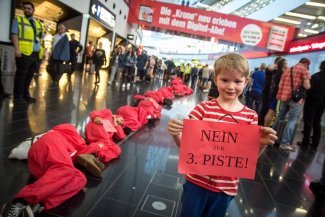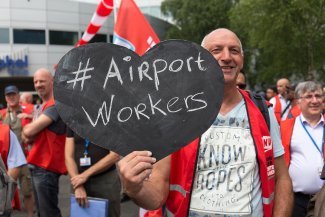In spring 2020, the world was hit by both the Covid-19 pandemic and an unprecedented wave of economic disruption. All sectors of the economy were affected, but none more so than the aviation industry. Pre-Covid, a legacy of glamour still resonated amongst the travelling public, who had visions of cabin crew and pilots who travelled the world in manicured uniforms, just as they did in the 1960s. Many still believed that the aviation industry was a good place to work and in some cases, it was. Most of the time, however, the ‘Pan Am effect’ of glamourisation only served to cover up the deep scars of liberalisation that the sector had endured for decades.
This was most clear in the ground handling and airports sector, where EU legislation like the Ground Handling Directive of 1996 introduced significant fragmentation of the sector in order to reduce costs for airlines, and in turn (and in theory) for consumers. Ground handling workers are the hidden heroes of the aviation industry. These are the people who load your bags, fuel your airplane, board you on a flight, clean the aircraft and check you in. They generally go unseen but without them – as we now know – the aviation industry will grind to a halt.
Despite their significant role, ground handling workers have been at the forefront of the liberalisation wave that has engulfed the aviation industry since 1996. By their nature, these are not easy jobs – ground handling workers are faced with early starts, late finishes, exposure to heavy rain, snow and blistering sunshine, as well as heavy loads and angry passengers. In addition to the difficult nature of the roles, workers have had to contend with consistently worsening labour conditions and the introduction of seasonal work, zero-hour contracts and minimum wage pay, all the while ensuring some of the most famous companies in the world continued to make a profit.
In the cabin, we have seen a race to the bottom driven by low-cost operators who have attempted to reduce the cost of work through both the types of contracts issued to workers and the categorisation of their employment. Just before the pandemic began, we saw the first ever self-employed cabin crew in Buzz, a Polish subsidiary of Ryanair, and an increase in the use of precarious contractors by companies like the Scandinavian airline SAS. Here too, the good days were gone, and cabin crew regularly face long hours, shift work and exposure to angry passengers. All in all, conditions were worsening and the job was becoming a lot less attractive.
In spring 2020, the aviation world was thrown into disarray and an industry solely focused on consistent growth was faced with the reality of collapse. Overnight, the industry went from record high passenger numbers to numbers not seen since the 1980s.
The sector was not prepared for this, and as usual the top priority remained profit and shareholder gain. Workers, on the other hand, took a back seat.
At the peak of the Covid-19 pandemic, the European Transport Workers’ Federation (ETF) estimated about 60 per cent of airport workers were out of a job – either on furlough or laid off. Companies which had been driven to privatisation suddenly went back to their previous owners begging for state aid, which all received with no strings attached.
Meanwhile, across the Atlantic, the US government adopted a state aid policy known as the CARES Act. This economic stimulus bill granted state aid to all aviation employers but required companies to maintain high levels of employment and to continue flying where possible. This saved thousands of jobs, but for the vast majority of European countries, that was not the case. By placing blind trust in aviation employers, governments knowingly or unknowingly handed cash indirectly to shareholders, and propped up unsustainable business practices, all with little consideration for the future or the sector’s tax-paying workers. This led to the current perfect storm, with a recovery of passenger numbers driven by increased personal savings made during Covid-19 by the middle class, and an industry hollowed out of workers thanks to naïve governments and greedy employers. Many of these workers will never come back.
A summer of discontent
Many employers and commentators say there was no way of knowing this was coming, but we beg to differ. Ahead of the 2021 summer season, we at the ETF warned the industry that this was going to happen. In all sectors of aviation, we anticipated a capacity crunch driven by a reduction in staff, equipment and facilities in a short-sighted attempted by employers to reduce cost and protect profits and shareholder dividends. But our words were ignored, and the greed continued with no consideration for what might come down the line.
Unfortunately, the predictions we made in 2021 have come true this summer. Workers have not returned to aviation, and many have stayed in other sectors of the economy where they took temporary shelter during the pandemic, finding a better work-life balance and improved conditions.
While it is clear that the ‘Great Resignation’ has affected all facets of the economy, the aviation industry is somewhere where nobody wants to work.
During most of its history, people were queuing to work in the industry, but poor conditions and low standards of work before the pandemic, combined with the pandemic’s exposure of the precarity of these jobs, and a long-standing minimalist approach to human capital, have resulted in a crisis.
Those workers who are left have been stretched to breaking point. They are working beyond what they have ever worked before, forced into overtime and left to deal with frustrated passengers who are also suffering from the result of corporate greed. In addition, many workers have not recovered their pay to pre-Covid levels, and those who have are facing a pay freeze, sky-high inflation and an increased cost of living. This situation is unacceptable for both workers and unions and has led unions to take the difficult decision to strike. So far, we have seen strikes in the Netherlands, Belgium, France, the UK, Spain, Portugal and Italy, and this trend can be expected to continue throughout the summer, as workers fight for wages they are owed and better working conditions.
Still, there is light at the end of the tunnel. Thanks to dialogue and collective bargaining, we have seen agreements reached at Schiphol Airport in the Netherlands, German airline Lufthansa and British Airways. Meanwhile in France, tripartite discussions have begun, postponing further strike action of airport workers and in air traffic control. While there is no quick fix to this crisis, social dialogue and collective bargaining are needed in every airport and with every airline to ensure there is value in working in aviation, and to ensure that the work workers do pays. Meanwhile, at European level, it is up to us to figure out how we have ended up in this situation, fix the root cause and make sure that both consumers and workers never face a situation like this again.












